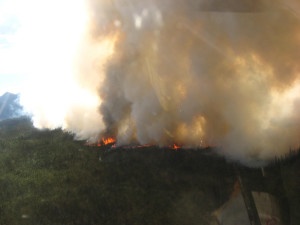We have much more to do and your continued support is needed now more than ever.
As Fish Die in Alaska Heat, Media Ignores Climate Tie

Over the past 50 years, temperatures in Alaska warmed twice as fast as the national average. The impacts of the warming temperatures on fish and wildlife are unmistakable: from polar bears whose ice hunting platforms are forming later in the year, to oysters infected with harmful bacteria only recently found in Alaska after the seabed warmed, and wild salmon suffering from parasites that are emerging as waters heat up.
As Reuters reported, grayling and rainbow trout numbering in the hundreds died in a Fairbanks lake where temperatures rose to 76 degrees Fahrenheit in June. In July, over 1,100 king salmon facing 80-degree water also perished.

Record-breaking heat has also created elevated wildfire risks in Alaska, even in the normally rain-soaked Tongass National Forest in the state’s southeastern panhandle.
Wildfires have charred more than a million acres across Alaska, according to state and federal wildfire managers, more than the five-year season-total annual average of 952,113 acres. Some 75 active fires were still burning on Friday, with much of the fire season still to come.
But the Reuters story never once mentioned climate change, let alone the carbon pollution caused by burning fossil fuels which are drilled from Alaska’s tundra and below threaten its waters.
As Media Matters has reported, climate science has fallen off Reuters’ radar screen since a climate science denier took over as managing editor:
David Fogarty, a former Reuters climate change correspondent, wrote that Managing Editor Paul Ingrassia, then serving as deputy editor-in-chief, identified himself as “a climate change skeptic” in 2012. As time went on, Fogarty alleged, “getting any climate change-themed story published got harder,” as some desk editors “agonized” over decisions and allowed articles to become mired in bureaucracy. Eventually, amid a “climate of fear,” Fogarty’s role was “abolished.”
Reuters is not alone in this massive avoidance of acknowledging climate science. From western wildfires to Mississippi River flooding, America’s news media prefers not to connect the dots for readers on climate change and extreme weather, hoping to avoid being accused by political partisans of “taking sides” in the battle between scientific reality and political denial. Our broadcast networks barely even mention climate change. And as NWF President & CEO Larry Schweiger has pointed out, when someone calls the media on it, they prefer to change the subject.
Help Salmon and Other Alaskan Wildlife
![]() Alaska’s wildlife—from salmon to polar bears—depend on us to fight for action on climate change.
Alaska’s wildlife—from salmon to polar bears—depend on us to fight for action on climate change.





















